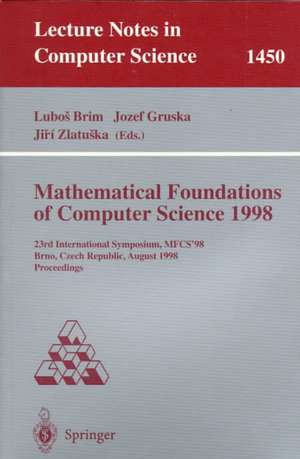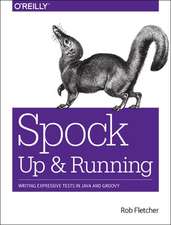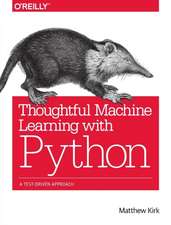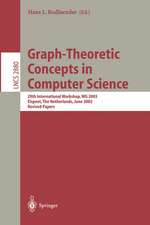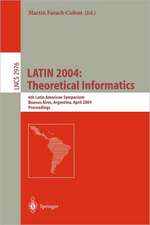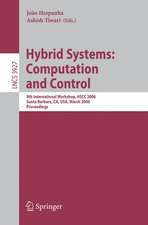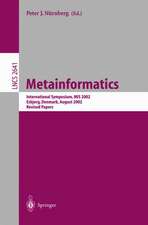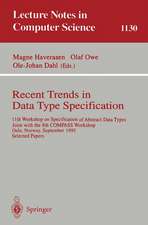Mathematical Foundations of Computer Science 1998: 23rd International Symposium, MFCS'98, Brno, Czech Republic, August 24-28, 1998: Lecture Notes in Computer Science, cartea 1450
Editat de Lubos Brim, Josef Gruska, Jiri Zlatuskaen Limba Engleză Paperback – 12 aug 1998
The 71 revised full papers presented were carefully reviewed and selected from a total of 168 submissions. Also included are 11 full invited surveys by prominent leaders in the area. The papers are organized in topical sections on problem complexity; logic, semantics, and automata; rewriting; automata and transducers; typing; concurrency, semantics, and logic; circuit complexity; programming; structural complexity; formal languages; graphs; Turing complexity and logic; binary decision diagrams, etc..
Din seria Lecture Notes in Computer Science
- 20%
 Preț: 1061.55 lei
Preț: 1061.55 lei - 20%
 Preț: 307.71 lei
Preț: 307.71 lei - 20%
 Preț: 438.69 lei
Preț: 438.69 lei - 20%
 Preț: 579.30 lei
Preț: 579.30 lei -
 Preț: 410.88 lei
Preț: 410.88 lei - 17%
 Preț: 427.22 lei
Preț: 427.22 lei - 20%
 Preț: 596.46 lei
Preț: 596.46 lei - 15%
 Preț: 448.04 lei
Preț: 448.04 lei - 20%
 Preț: 353.50 lei
Preț: 353.50 lei -
 Preț: 389.49 lei
Preț: 389.49 lei - 20%
 Preț: 309.90 lei
Preț: 309.90 lei - 20%
 Preț: 645.28 lei
Preț: 645.28 lei - 20%
 Preț: 763.23 lei
Preț: 763.23 lei - 15%
 Preț: 580.46 lei
Preț: 580.46 lei - 20%
 Preț: 310.28 lei
Preț: 310.28 lei - 20%
 Preț: 655.02 lei
Preț: 655.02 lei - 20%
 Preț: 1183.14 lei
Preț: 1183.14 lei - 20%
 Preț: 340.32 lei
Preț: 340.32 lei -
 Preț: 449.57 lei
Preț: 449.57 lei - 20%
 Preț: 591.51 lei
Preț: 591.51 lei - 18%
 Preț: 938.83 lei
Preț: 938.83 lei - 20%
 Preț: 337.00 lei
Preț: 337.00 lei - 20%
 Preț: 649.50 lei
Preț: 649.50 lei - 20%
 Preț: 607.40 lei
Preț: 607.40 lei - 20%
 Preț: 1414.79 lei
Preț: 1414.79 lei - 20%
 Preț: 1024.44 lei
Preț: 1024.44 lei - 20%
 Preț: 583.40 lei
Preț: 583.40 lei - 20%
 Preț: 453.32 lei
Preț: 453.32 lei - 20%
 Preț: 575.49 lei
Preț: 575.49 lei - 20%
 Preț: 1075.26 lei
Preț: 1075.26 lei - 20%
 Preț: 585.88 lei
Preț: 585.88 lei - 20%
 Preț: 825.93 lei
Preț: 825.93 lei - 17%
 Preț: 360.20 lei
Preț: 360.20 lei - 20%
 Preț: 763.23 lei
Preț: 763.23 lei - 20%
 Preț: 340.32 lei
Preț: 340.32 lei - 20%
 Preț: 504.58 lei
Preț: 504.58 lei - 20%
 Preț: 369.13 lei
Preț: 369.13 lei - 20%
 Preț: 580.93 lei
Preț: 580.93 lei - 20%
 Preț: 343.62 lei
Preț: 343.62 lei - 20%
 Preț: 350.21 lei
Preț: 350.21 lei - 20%
 Preț: 583.40 lei
Preț: 583.40 lei - 20%
 Preț: 583.40 lei
Preț: 583.40 lei - 15%
 Preț: 438.59 lei
Preț: 438.59 lei - 20%
 Preț: 341.95 lei
Preț: 341.95 lei - 20%
 Preț: 238.01 lei
Preț: 238.01 lei - 20%
 Preț: 538.30 lei
Preț: 538.30 lei
Preț: 673.83 lei
Preț vechi: 842.28 lei
-20% Nou
Puncte Express: 1011
Preț estimativ în valută:
128.95€ • 134.13$ • 106.46£
128.95€ • 134.13$ • 106.46£
Carte tipărită la comandă
Livrare economică 14-28 aprilie
Preluare comenzi: 021 569.72.76
Specificații
ISBN-13: 9783540648277
ISBN-10: 3540648275
Pagini: 872
Ilustrații: XVIII, 854 p.
Dimensiuni: 155 x 235 x 48 mm
Greutate: 1.2 kg
Ediția:1998
Editura: Springer Berlin, Heidelberg
Colecția Springer
Seria Lecture Notes in Computer Science
Locul publicării:Berlin, Heidelberg, Germany
ISBN-10: 3540648275
Pagini: 872
Ilustrații: XVIII, 854 p.
Dimensiuni: 155 x 235 x 48 mm
Greutate: 1.2 kg
Ediția:1998
Editura: Springer Berlin, Heidelberg
Colecția Springer
Seria Lecture Notes in Computer Science
Locul publicării:Berlin, Heidelberg, Germany
Public țintă
ResearchCuprins
Hypergraph traversal revisited: Cost measures and dynamic algorithms.- Defining the Java Virtual Machine as platform for provably correct Java compilation.- Towards a theory of recursive structures.- Modularization and abstraction: The keys to practical formal verification.- On the role of time and space in neural computation.- From algorithms to working programs: On the use of program checking in LEDA.- Computationally-sound checkers.- Reasoning about the past.- Satisfiability — Algorithms and logic.- The joys of bisimulation.- Towards algorithmic explanation of mind evolution and functioning.- Combinatorial hardness proofs for polynomial evaluation.- Minimum propositional proof length is NP-hard to linearly approximate.- Reconstructing polyatomic structures from discrete X-rays: NP-completeness proof for three atoms.- Locally explicit construction of r?dl's asymptotically good packings.- Proof theory of fuzzy logics: Urquhart's C and related logics.- Nonstochastic languages as projections of 2-tape quasideterministic languages.- Flow logic for Imperative Objects.- Expressive completeness of Temporal Logic of action.- Reducing AC-termination to termination.- On one-pass term rewriting.- On the word, subsumption, and complement problem for recurrent term schematizations.- Encoding the hydra battle as a rewrite system.- Computing ?-free NFA from regular expressions in O(n log2(N)) time.- Iterated length-preserving rational transductions.- The head hierarchy for oblivious finite automata with polynomial advice collapses.- The equivalence problem for deterministic pushdown transducers into abelian groups.- The semi-full closure of Pure Type Systems.- Predicative polymorphic subtyping.- A computational interpretation of the ??-calculus.- Polymorphic subtyping withoutdistributivity.- A (non-elementary) modular decision procedure for LTrL.- Complete abstract interpretations made constructive.- Timed bisimulation and open maps.- Deadlocking states in context-free process algebra.- A superpolynomial lower bound for a circuit computing the clique function with at most (1/6) log log n negation gates.- On counting ac 0 circuits with negative constants.- A second step towards circuit complexity-theoretic analogs of Rice's theorem.- Model checking Real-Time properties of symmetric systems.- Locality of order-invariant first-order formulas.- Probabilistic concurrent constraint programming: Towards a fully abstract model.- Lazy functional algorithms for exact real functionals.- Randomness vs. completeness: On the diagonalization strength of resource-bounded random sets.- Positive turing and truth-table completeness for NEXP are incomparable.- Tally NP sets and easy census functions.- Average-case intractability vs. worst-case intractability.- Shuffle on trajectories: The schützenberger product and related operations.- Gaußian elimination and a characterization of algebraic power series.- D0L-systems and surface automorphisms.- About synchronization languages.- When can an equational simple graph be generated by hyperedge replacement?.- Spatial and temporal refinement of typed graph transformation systems.- Approximating maximum independent sets in uniform hypergraphs.- Representing hyper-graphs by regular languages.- Improved time and space hierarchies of one-tape off-line TMs.- Tarskian set constraints are in NEXPTIME.- ??*-Equational theory of context unification is ? 1 0 -hard.- Speeding-up nondeterministic single-tape off-line computations by one alternation.- Facial circuits of planar graphs and context-free languages.-Optimizing OBDDs is still intractable for monotone functions.- Blockwise variable orderings for shared BDDs.- On the composition problem for OBDDs with multiple variable orders.- Equations in transfinite strings.- Minimal forbidden words and factor automata.- On defect effect of bi-infinite words.- On repetition-free binary words of minimal density.- Embedding of hypercubes into grids.- Tree decompositions of small diameter.- Degree-preserving forests.- A parallelization of Dijkstra's shortest path algorithm.- Comparison between the complexity of a function and the complexity of its graph.- IFS and control languages.- One quantifier will do in existential monadic second-order logic over pictures.- On some recognizable picture-languages.- On the complexity of wavelength converters.- On Boolean vs. Modular arithmetic for circuits and communication protocols.- Communication complexity and lower bounds on multilective computations.- A finite hierarchy of the recursively enumerable real numbers.- One guess one-way cellular arrays.- Topological definitions of chaos applied to cellular automata dynamics.- Characterization of sensitive linear cellular automata with respect to the counting distance.- Additive cellular automata over ?p and the bottom of (CA,?).
